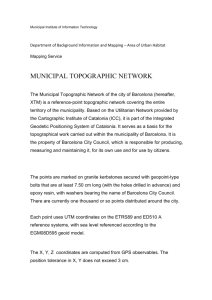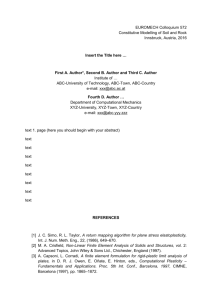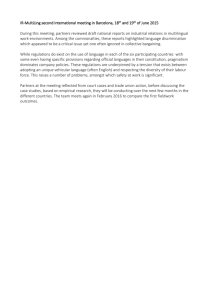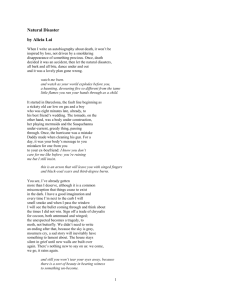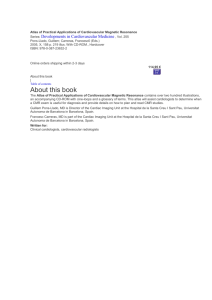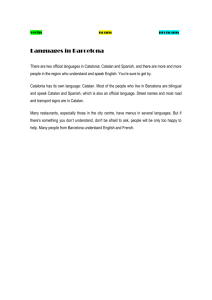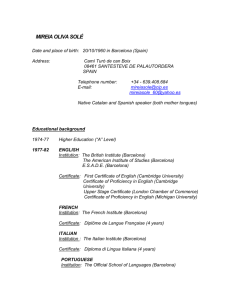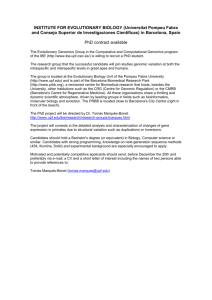Science & the City: a metropolitan strategy
advertisement
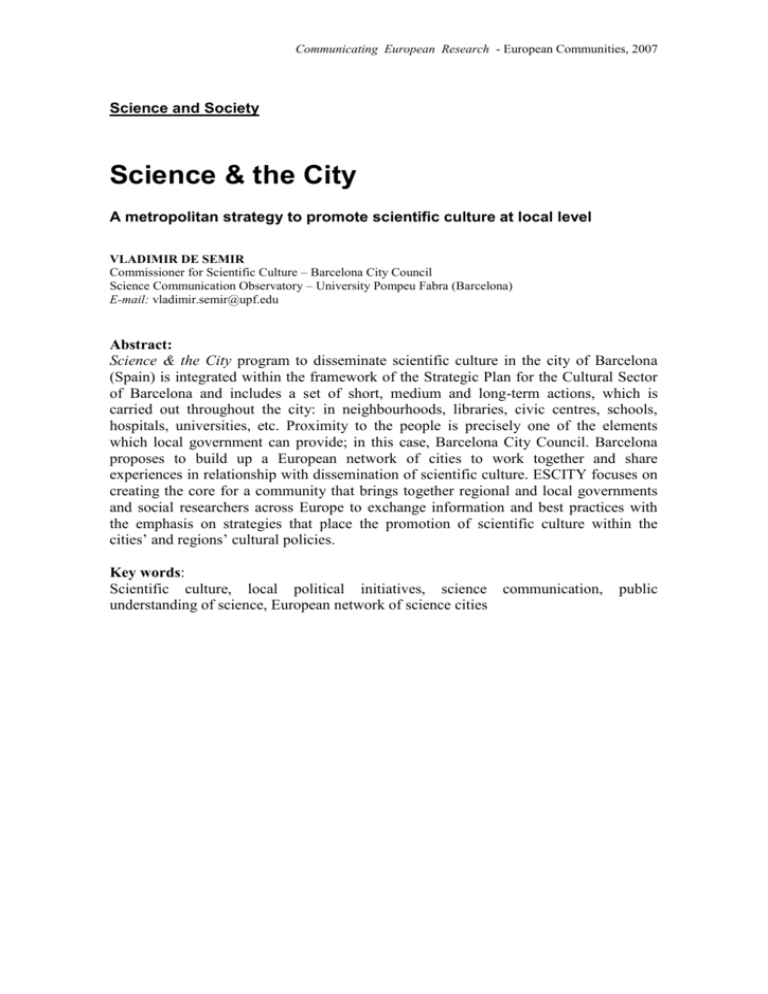
Communicating European Research - European Communities, 2007 Science and Society Science & the City A metropolitan strategy to promote scientific culture at local level VLADIMIR DE SEMIR Commissioner for Scientific Culture – Barcelona City Council Science Communication Observatory – University Pompeu Fabra (Barcelona) E-mail: vladimir.semir@upf.edu Abstract: Science & the City program to disseminate scientific culture in the city of Barcelona (Spain) is integrated within the framework of the Strategic Plan for the Cultural Sector of Barcelona and includes a set of short, medium and long-term actions, which is carried out throughout the city: in neighbourhoods, libraries, civic centres, schools, hospitals, universities, etc. Proximity to the people is precisely one of the elements which local government can provide; in this case, Barcelona City Council. Barcelona proposes to build up a European network of cities to work together and share experiences in relationship with dissemination of scientific culture. ESCITY focuses on creating the core for a community that brings together regional and local governments and social researchers across Europe to exchange information and best practices with the emphasis on strategies that place the promotion of scientific culture within the cities’ and regions’ cultural policies. Key words: Scientific culture, local political initiatives, science communication, understanding of science, European network of science cities public Communicating European Research - European Communities, 2007 In July 2002, all the political groups represented in the Barcelona City Council voiced their unanimous support to the “Science and Society Action Plan” drawn up by the European Commission. This commitment to Europe was a decisive step for incorporating scientific culture into the different areas of municipal government, particularly in the Culture Institute of Barcelona. The promotion of scientific culture is, today, a part of the political agenda of the local government of the city of Barcelona. This was reaffirmed in November 2004 with the presentation, in a plenary session of the City Council, of the strategic plan Science & the City for the period 2005-2015. The programme Science & the City constitutes the drive of the Culture Institute of Barcelona, in close co-operation with the rest of municipal areas and departments to promote scientific culture among citizens. As well as receiving strong political support from the areas responsible for its implementation, lines of analysis encourage this strategy and this monitoring carried out by the Science Communication Observatory at the Pompeu Fabra University. At the initiative of the Culture Institute of Barcelona, this university will become the location of the future Academy of Society & Science. A think-tank born as a legacy of the Barcelona 2004 Forum of Cultures event and an initiative derived from the international network Public Communication of Science and Technology (PCST). In the coming years the PCST Network will experience an important expansion in its global influence, but we have to work to guarantee that the activities from those countries with more financial difficulties will be incorporated into the net. It is not only about the PCST-net continuing growing, but it is related to a wider representation of the different cultures in the world. In this sense Science Communication has to respect different cultural contexts and integrate knowledge from all the continents. This is one of the main PCST targets. This present and future cultural diversity is it’s the greatest PCST heritage! This is another relevant legacy from the Forum of Cultures Barcelona 2004 related with the spread of scientific culture and the commitment of the Barcelona City Council to do this at the local political level. The Local Authorities Forum of Porto Alegre –mayors and local government representatives from all over the world committed to social inclusion- met in Barcelona in May 2004 and proclaimed the basis document named Cultural Agenda 21. The idea arose to contribute in formulating answers to the cultural development challenges we are now facing in the 21st century, given that the tendency of exclusive, uniform globalisation threatens culture. The initiative has a clear precedent in the process toward the end of the last century regarding the environment, when it was evident that, current development models, excessively predatory on resources and natural ecosystems, first mobilised world public opinion which later irreversibly influenced government and international institutions. There are indisputable political analogies between cultural and ecological problem areas given that culture as well as environment is common wealth of humanity. Today a similar sensitivity is emerging in the cultural field, for this it plays a central role in globalisation but there is a lack of instruments for a true political debate. Thus it is especially important to develop agreements defining the cultural diversity and preserving the values of creativity, participation and inherent freedom of the cultural generation. At the same time it is also important to influence in the necessary balance between knowledge and power. In this sense a new sustainable development is already Communicating European Research - European Communities, 2007 on the scene related to the binomial: knowledge and power. These are the fundamentals carried out by the Local Authorities Forum that lead Barcelona and Porto Alegre to suggest the Cultural Agenda 21. Local governments are currently working on a key document to propose the need to boost open and diverse cultures in a world characterised by globalisation. It is also important to adopt the commitment for culture to have an essential dimension in urban politics and in real participatory democracies that support social cohesion. A relevant aspect of the Cultural Agenda 21 is the compromise to "encourage programs directed to science dissemination and technological cultures among all citizens". They consider that the application of new scientific knowledge generates ethical, social, economical and political questions that are of clear public interest. Science & the City program of Barcelona works in this direction, with the will to share experiences and build networks of co-operation with other cities throughout the world. Because shearing scientific culture is also a universal process. The challenges Barcelona is a city with a solid scientific and technological tradition. A large part of this tradition is linked to the considerable development which took place following the industrial revolution and which gave prominence to sectors such as engineering and biomedicine. But, as well as these traditional values, the transformations deriving from the expansion of the knowledge society have led to the emergence in recent years of new sectors in the city and there are even more changes to be undertaken. Science & the City is Barcelona’s strategic plan for promoting and disseminating scientific culture, the traditional values of the city and the new strategic sectors... But, in addition to all that, it is a response to the problems and shortcomings which already exist and which are at risk of becoming worse as the process of the expansion of science and technology moves forward. Specifically, the Science & the City action plan poses the following 10 challenges for the future: 1. To encourage a more active population with greater decision-making capacity in the face of new scientific, medical and technological challenges 2. To consolidate the public image of research and innovation as activities which generate wealth and, therefore, as key elements of development 3. To improve the chances of accessing new opportunities, thus strengthening social cohesion and reducing the educational and digital divides. 4. To drive the transformation process of Barcelona’s science centres and museums towards the new Museum of Natural History of Catalonia –our region- and, at the same time, promoting the role of these elements, which articulate the scientific culture of the city 5. To strength the city-university-enterprise triangle by encouraging synergies between the three sectors. 6. To identify and promote the key strategic areas for the development of Barcelona in the knowledge society 7. To encourage knowledge and dissemination of local scientific values coming out from the university environment. Communicating European Research - European Communities, 2007 8. To redirect the current crisis in scientific vocations among young people, guaranteeing the future competitiveness of the city in terms of research and development 9. To correct the gender imbalance in the area of science and technology by encouraging greater participation and visibility of women 10. To promote the values of Barcelona internationality as a hothouse city generating ideas, projects and opportunities The program Science & the City is integrated within the framework of the Strategic Plan for the Cultural Sector of Barcelona and includes a set of short, medium and long-term actions, which is carried out throughout the city: in neighbourhoods, libraries, civic centres, schools, hospitals, universities, etc. Proximity to the people is precisely one of the elements which local government can provide; in this case, Barcelona City Council. In addition to this proximity there are multiple formats, some traditional and other innovative, but all thorough in their implementation and follow-up. Apart from these actions it is included in the specific annual programmes that define the city’s cultural agenda. Thus, for example, 2005 was the Year of the Book and Reading throughout Spain at the initiative of the city of Barcelona, meeting with the fourth centenary of the publication of Don Quixote. In this context, in November 2005 was held a symposium on the role of Popular Science Books and the new opportunities provided by current technologies in order to encourage reading in the area of science – often the source of scientific vocations among young people. At the same time, an annual fair of Popular Science Book was created. Another example of these annual programs is the aim to declare 2007 the Year of Science, thus reaffirming a process of scientific culture integration overall the cultural planning of the city. As well as the annual programs, there are other regular or permanent activities. These include the Science Autumn, Women and Science, Science on the Street, the activities from the development of the Academy of Society and Science, the Barcelona Forum of Innovation and Scientific Culture, etc. The programme, Science & the City, is strictly a municipal initiative. It is planned and developed in collaboration with all sectors where the citizenship is represented, with a special emphasis on the role of the universities and research centres of education, enterprises and the industrial sector. Here are some of the specific actions: Cycle of lectures “Genetics and City” aiming to sensitize citizens on the advances in this area of knowledge that opens many doors to hope, but also ethical challenges. Popular itinerary through Barcelona’s neighbours in the exhibit “Science in our pockets” that popularizes significant people in the history of science using money bills from various countries (before the euro, of course) as inspiration. Popularization lectures, “Science in the neighbourhood” in the civic centres in the various neighbourhoods to bridge the gap between scientists and Barcelona’s Communicating European Research - European Communities, 2007 popular culture. Airing, on the local television channel BTV, of the lectures celebrated during the cycle. Publication of the tour guide “Walks through scientific Barcelona” that provides the city with a guide to the knowledge of its scientific history and current state, similar to those existing in Paris and London and presenting several scientific itineraries through the city for schools and other cultural activities. Organization of the series of lectures “Barcelona’s scientific look” analyzing Barcelona from geological, biological, chemical, physical, mathematical points of view and that will be aired through the municipal local TV channel BTV. Production, with the collaboration of the Science Communication Observatory at the UPF of 26- ten minute “capsules” (short programs of 5 minutes) for the local channel BTV –funded by the Science and Technology Foundation, of the Science and Technology Department in the framework of the national program for the popularization of sciences –in which 26 scientists from Barcelona provide brief summaries of their research and the reasons for which they conduct these studies as part of their scientific vocation. Conducting of a quantitative and qualitative study, in collaboration with the Audiovisual Council of Catalonia of the science programs aired in Spanish and Catalan televisions. Deployment of science popularization in high schools in Barcelona in collaboration with the Municipal Institute of Education in Barcelona. Organization, with the department of Policies for Women and Education from Barcelona City Council at the Symposium “Women, Men and Science”, debating on gender-related aspects involving scientific vocation and carriers and promoting equality among women and men in science, a point to be proclaimed as one of the goals of the Action plan “Science and Society” of the European Commission. Of course, these initiatives are not strictly new, but these are usually policies led by universities, science centres, labs... rather than the local governments of the cities, who have a wider area of influence in society. This is the main objective: to extend the programs and action to more people… The scene is still in a very preliminary status and, though in the following years there will certainly be a progress, we should foster the development of city networks, collaboration among administrations, in order to cooperate and share experiences in the promotion of scientific culture. On the other hand, a part of the current media –particularly local or regional TV channels and radio stations- belong to the local or regional administrations, what clearly promotes the possible impact of these actions, as they are “proximity media” of the citizens. Furthermore, we must take into account that such administrations are also responsible for the cultural offer and construction of the cities in the ‘conventional’ sense of the word (i.e. those responsible for the spread of the humanistic and artistic culture). So, integrating the scientific culture as another type of culture is one of the unresolved matters of the European local administrations. Communicating European Research - European Communities, 2007 The network The Science in Society Forum held in March 2005 in Brussels underlined the need for a greater institutional commitment across Europe in raising the profile of science as an integral part of our culture. Despite the advances made since the launch of the Commission’s Science and Society Action Plan, little has been done so far to erode the borders between the “two cultures” and promoting scientific culture is not usually an issue of our cultural agendas. Besides, most actions are implemented at a national level by scientific institutions while the municipality is the closer administration to citizens and, probably, the most flexible in incorporating new public engagement tools. For this reason, the municipality of Barcelona proposes to build up a European network of cities to work together and share experiences in relationship with dissemination of scientific culture. ESCITY focuses on creating the core for a community that brings together regional and local governments and social researchers across Europe to exchange information and best practices with the emphasis on strategies that place the promotion of scientific culture within the cities’ and regions’ cultural policies. The project aims to settle the basis for a wider and lasting network, able to act as a lobby to strengthen the promotion of scientific culture as a basic item on the cultural agendas of European cities and regions. These are the main objectives: To provide a broad forum for scientific culture issues across Europe. Benchmarking the promotion of scientific culture at regional and local level. To organise a European Conference to be held in Barcelona in 2007, which the city has declared “Science Year”. Prior, contacts will be made with other European networks of cities in order to gather experiences, concerns and suggestions relevant to ESCITY and identify potential participants and network members. To engage in a lobby strategy by publishing an action guide to be distributed to European governments, its contents being the forum conclusions, a list of best practices, the benchmarking main findings and a set of tools and recommendations for local and regional governments. ESCITY is a two year project -that will start in March 2006- that aims to provide a solid basis for this new community to expand and consolidate beyond the 6th Framework Programme. The project brings together 6 institutions coming from 5 EU member states (Spain, Austria, Italy, Portugal and Norway). From those, 4 are governmental institutions that are currently engaged in the promotion of scientific culture, and the other 2 are research centres working on issues regarding science communication and public understanding of science. We hope that at the end of this project many other European cities will join the ESCITY network and scientific culture will be a part of the political programs of their local governments!
